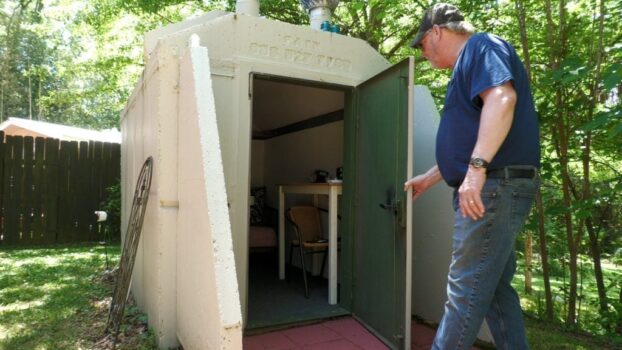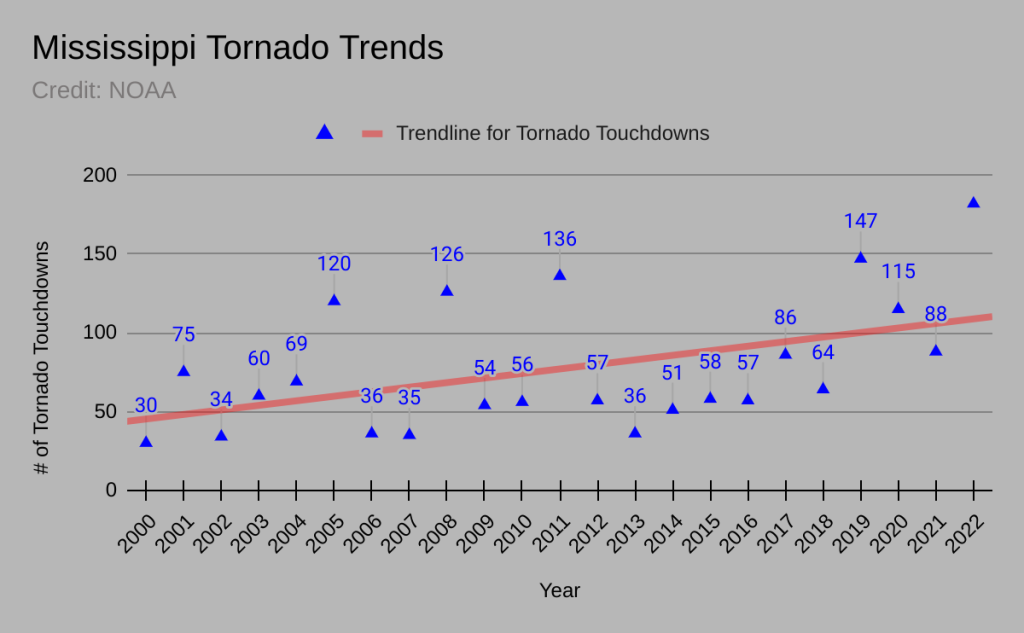Tornadoes and tears – surviving more storms
Published 11:45 am Saturday, June 22, 2024

- Homeowner Paul Senseman inspects his tornado shelter. Photo by Cody Farris.
Story by Seth Parenteau and Cody Farris
UM journalism students
The devastation caused last spring by an EF4 tornado in Rolling Fork turned the national spotlight on Mississippi. And while the state has been lucky enough to not have faced any storms of that magnitude in so far in 2024, according to Memphis Chief Meteorologist Andrew Humphrey these types of storms are going to become more common in the state.
“Since the mid-1980s up until now tornadoes have been more frequent in the Mid-South and in the Deep South with the Mid-South being at the bullseye,” Humphrey said.
And there is clear evidence for this, according to data gathered by the National Oceanic and Atmospheric Administration, which found the rate of tornadoes in Mississippi has been steadily on the rise.

Major advancements in tornado prediction and detection since the 1990s could be driving some of the increase in numbers, according to Humphrey, and he said the timing of that detection is critical in reducing deaths and injuries.
“The challenge is always being able to detect tornadoes earlier rather than later and actually tracking them and detecting them whether it’s day or night,” he said.
To make matters worse in Mississippi, Humphrey said that the current detection system is not ideal due to the state’s unique topography, as compared to others in tornado alley. Since radar cannot actually detect a tornado, the weather service uses people as spotters, and Mississippi’s heavily forested areas make that more challenging.
However, that’s a problem that University of Mississippi physicist Dr. Roger Waxler is looking to fix. Waxler is a scientist in the National Center for Physical Acoustics. He was recently awarded a $2 million federal grant focused on studying a new form of tornado detection that uses sound.
“We have found that we can acoustically detect tornadoes from great distances using an infrasonic signal that the tornado emits,” Waxler said.
Waxler and his team have developed a specialized sensor, which includes a battery, solar panel, windscreen, and a device that records acoustic signals that tornadoes emit, but humans cannot hear. The hope is to develop a better system for detecting and tracking tornados so that warnings can get out to people faster.
“[this will] have a huge impact on saving lives. This is what this is about,” Waxler said.
Waxler said that while he hopes this will reduce the loss of life, he notes that there is nothing that can be done about the massive amounts of property damage caused by these storms; a scenario that the Senseman family is all too familiar with.
Susan Senseman and her husband Paul had been living at their home in Edwards, Mississippi for 20 years before losing it to a tornado in 2008. Senseman says that, being a Southerner and having lived through many tornado warnings, she wasn’t initially concerned about the tornado that would ultimately destroy their home.
“We lived so far out in the country we had no tornado sirens, but we had a radio. Well, when you’re trying to sleep and the radio keeps going off. So I decided to unplug it — a bad decision,” she said with a rueful laugh.
Senseman said it wasn’t until their son Jared, who was monitoring the storm, called them to warm them that they realized this was serious.
“Jared was actually working in Clinton and he called me probably about 12 o’clock and said ‘There’s a tornado out there.’ And being blasé and from the South, seeing tornados all the time I said,‘There’s always tornados.’ Then I could hear it.”
At that point homeless and having to start from scratch, the Sensemans were intent on finding a home that provided some level of security from storms. That’s when they were lucky enough to find a home in Myrtle, Mississippi that already had a storm shelter on its property.
Senseman said they no longer take any risks. If there is the threat of a storm, they go to the shelter, which they keep stocked with necessities.
“We have a box that, when we know the weather is going to be bad for a day or two, we go ahead and stock that with three or four days worth of medicines that we need, any important papers, which we try to have some cash on hand and we we have the radio in there and so we feel…I don’t know that you can ever be fully prepared, but we feel like, at least for a few days, we’d be able to get through it until we can get some significant help,” Senseman said.
Now having faced the devastation that a tornado can bring, Senseman said that those who choose to ignore the threat of storms do so “… at their peril.”





